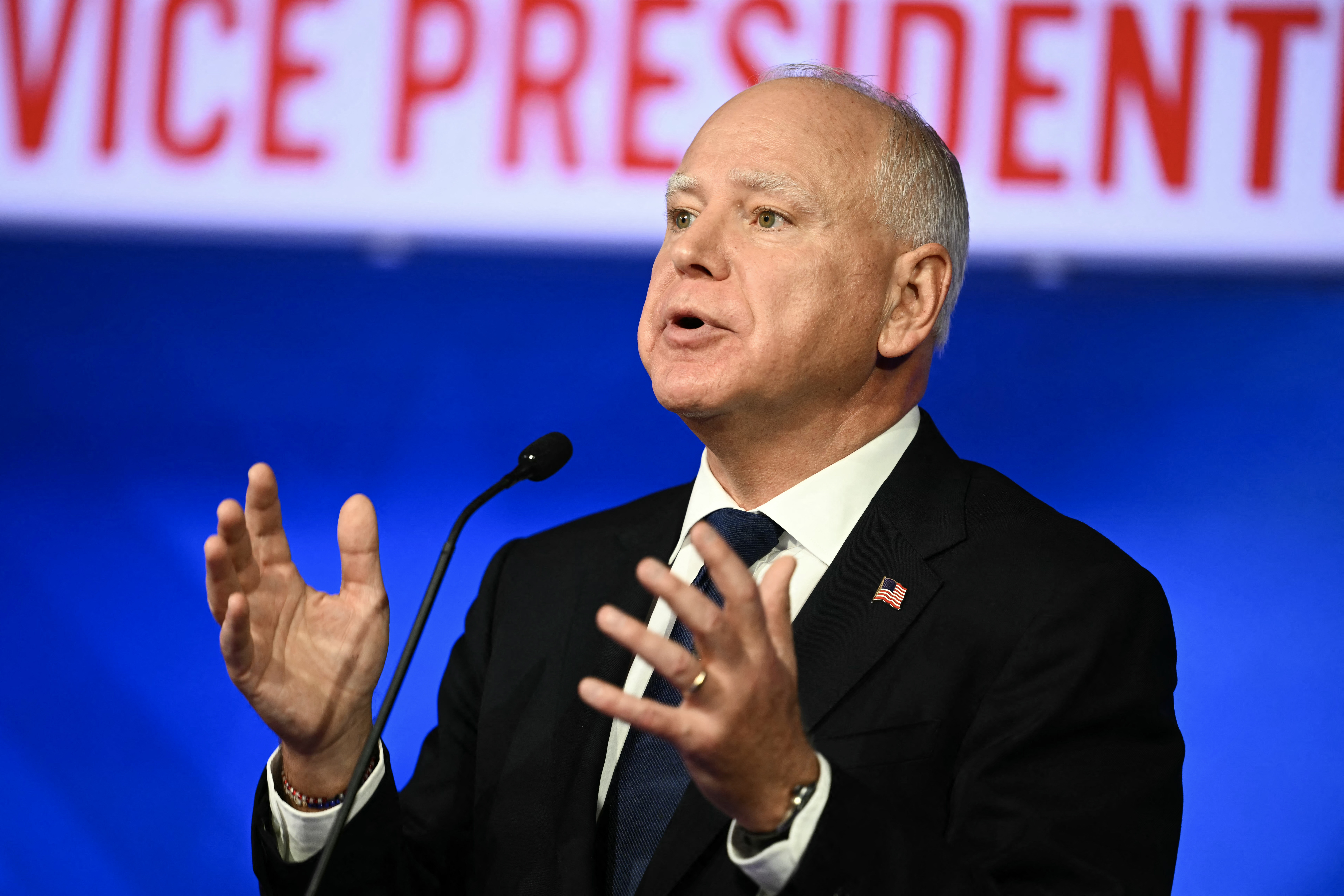
Minnesota Governor and Democratic vice presidential candidate Tim Walz speaks during the Vice Presidential debate with US Senator and Republican vice presidential candidate J.D. Vance, hosted by CBS News at the CBS Broadcast Center in New York City on October 1, 2024. Agence France-Presse
WASHINGTON — Multiple news reports indicate that Democratic vice presidential nominee Minnesota Gov. Tim Walz misleadingly claimed he was in Hong Kong during the turbulence surrounding the 1989 Tiananmen Square massacre, part of a broader pattern of inaccuracies that Republicans hope to exploit.
At Tuesday night’s vice presidential debate, Walz was asked about misleading people and he ultimately when pressed said he “misspoke.” But Walz said that he can “get caught up in rhetoric” and that “I’ve tried to do the best I can, but I’ve not been perfect.
And I’m a knucklehead at times.” He then added that former President Donald Trump should have come on one of his trips to China, and if he had done so, then the Republican nominee would know better than to compliment Chinese President Xi Jinping on his handling of the 2020 pandemic.
READ: Tim Walz, JD Vance meet in their first and possibly only VP debate
On Tuesday, CNN posted a 2019 radio interview in which Walz stated he was in Hong Kong on the day of the massacre, when publicly available evidence suggests he was not.
Article continues after this advertisement
After a seven-week demonstration in Beijing led by pro-democracy students, China’s military fired heavily on the group on June 4, 1989, and left at least 500 people dead.
Article continues after this advertisement
Minnesota Public Radio reported Monday that publicly available accounts contradict a 2014 statement made by Walz, then a member of the U.S. House, during a hearing that commemorated the 25th anniversary of the massacre. Walz suggested that he was in the then-British colony of Hong Kong in May 1989, but he appears to have been in Nebraska. Public records suggest he left for Hong Kong and China in August of that year.
READ: Walz, Vance clash on policy while attacking each other’s running mates
The Associated Press found a 2009 congressional transcript about Tiananmen Square in which Walz seemed to insinuate that he was in Hong Kong during the day of the massacre.
The vice presidential candidate also has made statements in which he misrepresented the type of infertility treatment received by his family, and there have been conflicting accounts of his 1995 arrest for drunk driving and misleading information about his rank in the National Guard. Walz and his campaign have also given different versions of the story of his 1995 arrest for drunken driving.
Walz has also claimed that he has traveled to China more than 30 times, but his campaign said that the actual number was “closer to 15.”
Minnesota Public Radio on Monday revealed that a photo published on May 16, 1989, showed that Walz was working in the National Guard Armory in Alliance, Neb., at the time and that an August 1989 story said Walz was to leave for China.
During the 2014 hearing on Tiananmen Square, Walz testified: “As a young man I was just going to teach high school in Foshan in Guangdong province and was in Hong Kong in May 1989. As the events were unfolding, several of us went in. I still remember the train station in Hong Kong. There was a large number of people — especially Europeans, I think — very angry that we would still go after what had happened.”
“But it was my belief at that time,” Walz continued, “that the diplomacy was going to happen on many levels, certainly people to people, and the opportunity to be in a Chinese high school at that critical time seemed to me to be really important.”
Minnesota Public Radio said the evidence shows that Walz, then a 25-year-old teacher, was still in Nebraska in May 1989. He went to China that year through WorldTeach, a small nonprofit based at Harvard University.
The news organization found a newspaper photograph published on May 16, 1989, of Walz working at a National Guard Armory.
A separate story from a Nebraska newspaper on August 11 of that year said Walz would “leave Sunday en route to China” and that he had nearly “given up” participating in the program after student revolts that summer in China.
Some Republicans have criticized Walz for his longstanding interest in China. Besides teaching there, he went back for his honeymoon and several times after with American exchange students.
Your subscription could not be saved. Please try again.
Your subscription has been successful.
Kyle Jaros, an associate professor of global affairs at the University of Notre Dame, told The Associated Press that it’s become “a well-worn tactic to attack opponents simply for having a China line in their resumes.”



















